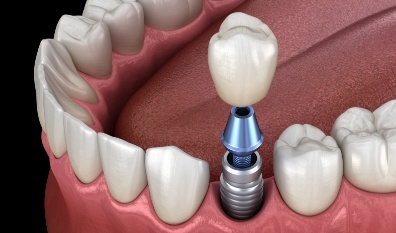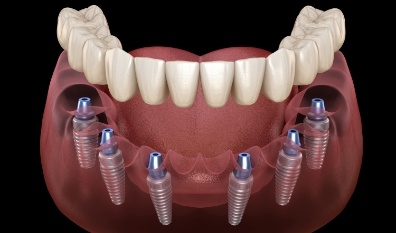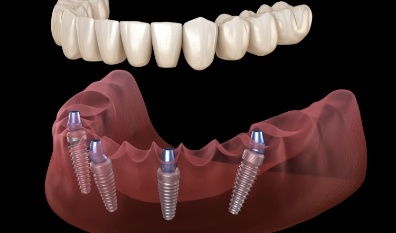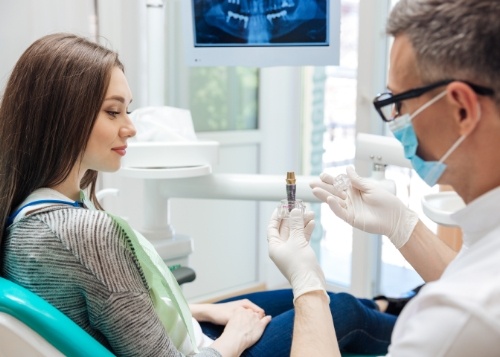Dental Implants Goodyear
The Closest Tooth Replacement to the Real Deal
Over the last couple of decades, the dental implant procedure has been nearly perfected and boasts an impressive 98 percent success rate. Due to its unique properties, it’s one of the most popular tooth replacement solutions among patients. By restoring both the missing root and biting surface of teeth, it’s able to provide patients with a prosthetic that looks and feels completely natural. This leads to boosted confidence and improves overall quality of life. To learn more, you can read below or contact our dental office to schedule a consultation with Dr. Wheeler or Dr. McDowell to discuss replacing missing teeth with dental implants in our Goodyear, AZ dental office.
Why Choose Goodyear Family Dentistry for Dental Implants?
- Start-to-Finish Dental Implant Treatment
- KaVo 3D Cone Beam CT Scanner
- Medit i500 Digital Impression System
What is a Dental Implant?

A dental implant is a small, titanium post that is surgically placed below your gums and into the jaw to restore the root of a missing tooth. Due to its biocompatible nature, it’s able to naturally fuse with the jawbone to provide it with blood flow and stimulation. Once the fusion is complete, a small, metal connector piece is attached to the implant that will hold a restoration. Depending on your unique tooth loss situation, you can have a crown, bridge, or denture secured to your implant posts to restore your smile.
The 4-Step Dental Implant Process

Unlike getting dentures or a dental bridge, dental implants require a multi-step process that can take several months to complete. This may seem like a long time, but all of the benefits that you will experience are worth the wait. At Goodyear Family Dentistry, we complete the entire dental implant process start-to-finish instead of referring you to another location. Here are the main steps that you can expect when restoring your smile.
Initial Dental Implant Consultation

The first step in the process of getting dental implants is your consultation. At this time, we will examine your smile and surrounding facial structures. This will help us determine whether or not you make a good candidate for implants and where they should be placed in your mouth. During this visit, we are also happy to talk you through any part of the process, including the cost.
Sometimes, patients need to get preliminary procedures before they can proceed with the dental implant placement process. This may include bone grafting, gum disease therapy, and tooth extractions. After this, we can continue to plan the rest of your treatment.
Dental Implant Surgery

When the time of your procedure comes around, we will begin by numbing your mouth with a local anesthetic. Next, a small incision is made into the gum tissue to access your jawbone. The implants are placed at very precise angles and locations to fit in naturally with your smile. The last step is for your gums to be closed and protective caps to be placed over the posts to keep them safe during the dental implant healing process.
Dental Implant Osseointegration & Abutment Placement

For the next few months, the fusion process will take place between your dental implant and your jawbone. This process is called “osseointegration.” This is what allows for your implants to maintain a sturdy foundation so that your replacement teeth can stay in place when you speak and chew. When osseointegration is complete, the metal abutments will be placed on the ends of your implants.
Delivery of Dental Implant Restorations

Once your abutment has been placed, your restoration should be good to go. You may return to the practice where you will receive your new crown, bridge, or denture. During this visit, we will check to ensure that your bite is comfortable so you can enjoy all of the benefits of your restored smile!
Benefits of Dental Implants

Dental implants offer a slew of unique benefits that sets them apart from traditional restorative treatments. Some of the advantages that you’ll be able to enjoy with dental implants include:
- Lifespan of 30+ years
- 98 percent treatment success rate
- Preservation of jawbone density
- Prevent sagging, hollow-looking, and drooping facial features
- Natural looking and feeling replacement teeth
- No need to worry about unstable restorations
- No alteration of your surrounding teeth required
- Enhanced eating and speaking abilities
Are Dental Implants Right for You?

The best way to learn whether dental implants are right for you is to schedule a consultation with Dr. Wheeler or Dr. McDowell. Our team will conduct a thorough examination of your mouth and take X-rays to determine whether you would be a good candidate for the procedure. Typically, we look for some of the following traits in a good dental implant candidate:
- Sufficient jawbone density
- Dedication to maintaining good oral hygiene
- Good oral health
- Free of autoimmune diseases
If you don’t meet all of these requirements right away, there’s no need to worry. We offer preparatory procedures that can help get you there over time. Once we determine that implants are right for you, we’ll develop a customized treatment plan and walk you through it.
Missing Single Tooth

To restore a single missing tooth, we can place one dental implant in the gap between your teeth below the gums. The post will secure a customized dental crown into place, restoring your completed smile.
Missing Multiple Teeth

If you’re missing two or more consecutive teeth, we can place a bridge secured to two dental implant posts located at either end of the gap in your smile. That way, instead of needing to alter your natural teeth to anchor the prosthetic, the implants will provide it with unwavering support.
Missing All of Your Teeth

An implant-retained denture can be attached to anywhere from four to eight dental implants located at various positions in your arch. Once attached to the posts, you won’t have to worry about slipping or shifting dentures.
All-on-4/Teeth-in-a-Day

For patients who are missing an entire arch of teeth and don’t want to undergo the waiting period between implant surgery and the placement of your restoration, we also offer Teeth-in-a-Day. On the day of your surgery, we’ll place a load-bearing denture so you don’t have to go through an extended period of time without your pearly whites.
Understanding the Cost of Dental Implants

To find out the price of your dental implant treatment, we’ll need to first examine your mouth and confirm several cost-determining factors. This includes the number of implants you need placed and any specific treatments you have to complete before surgery can be performed. Keep in mind that while dental implants are more expensive on average, you truly get what you pay for in terms of your tooth replacement. At your initial consultation, we’ll discuss all of these details with you and walk you through a breakdown of the price of treatment.
Dental Implant FAQs
How Long Do Dental Implants Last?
Dental implants are one of the most permanent solutions for missing teeth, capable of lasting well over 30 years. Of course, their exact lifespan depends heavily on your oral health and lifestyle. You can help your upgraded smile’s durability by brushing twice a day along with daily flossing and rinsing with an ADA-approved mouthwash. Make sure you visit our dentist every six months for a checkup and cleaning as well!
Does Getting Dental Implants Hurt?
Before the procedure begins, we will numb your mouth with a local anesthetic to ensure you’re completely comfortable. You’ll also most likely be sedated during your surgery which means your body’s ability to register pain will be much lower. For the first few days following dental implant placement, your mouth may feel sore and irritated. Fortunately, you can easily manage your discomfort by taking over-the-counter pain medication and using cold compresses.
How Long Does It Take to Recover from Dental Implant Surgery?
Most patients can return to their usual activities the day after surgery. However, it’s incredibly important you avoid strenuous exercise for the first 1-2 weeks, as it can hinder the healing process. Although you can expect some bleeding and swelling after your procedure, it should stop within 3-4 days. While you recover, make sure to take your prescribed or over-the-counter pain medication as directed. It’s worth noting you may need up to six months for the implants to fuse with your jawbone via osseointegration.
Will People Be Able to Tell That I Have Dental Implants?
Your restorations are going to be personalized for your smile because your implant dentist in Goodyear takes impressions of your mouth to create them. Once they are placed, people shouldn’t be able to tell the difference between them and your natural teeth. The implants are secured in your jaw like tooth roots, so you won’t need to hold your jaw awkwardly to keep them in place as you might with poorly fitting dentures. The combination of natural appearance and secure fit is unmatched!
